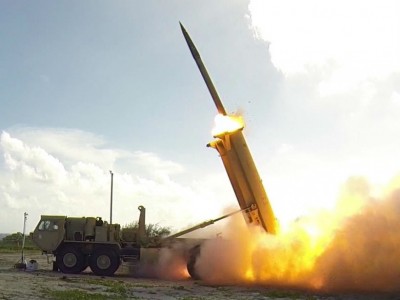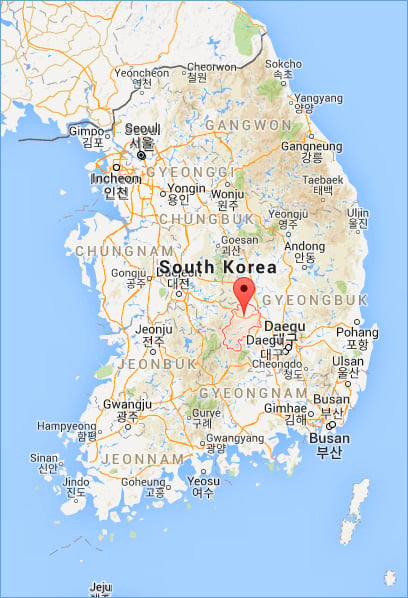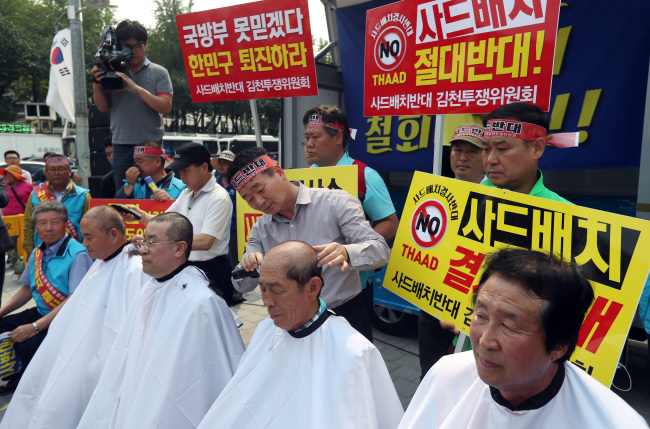Directed against China: New Site for U.S. THAAD Missile Deployment in South Korea

Republic of Korea (ROK) on Friday announced a new site for the deployment of the Terminal High Altitude Area Defense (THAAD) missile-defense system despite of strong opposition from locals and reasonable concerns of China and other regional countries. The announcement came just days after the US military set the deployment deadline as the end of next year.
The ROK government cited the concerns of the public in Seongju county, the originally-designated site, as the reason for the alteration, but a site change is not a prescription at all.
Despite the altered site, local public are expected to continue their opposition to the THAAD deployment. In Gimcheon (see map below), a southeastern city that is closer to the newly-chosen site, enraged residents have begun a new round of backlash.
As a matter of fact, the ROK government can neither appease the concerns of people from the designated sites, nor persuade its citizens to believe in the so-called effectiveness of the missile shield in protecting its national security.
Democratic People’s Republic of Korea (DPRK)’s fifth nuclear test offered Seoul’s plan a new selling point. ROK government, by using the test as a more “convincing” excuse, advertised the so-called necessity to install the THAAD system, cement its military alliance with the US and resist threats through extended deterrence.
However, to avoid further deterioration of tensions on Korean Peninsula, a comprehensive and systematic solution must be found out to address both symptoms and root causes.
Past and present facts have proved that in order to sustain the peace and stability of the peninsula, efforts must be devoted to denuclearizing the peninsula, normalizing the ties between concerned countries, and building a peace and security mechanism for Northeast Asia.
The evolution course of the peninsula also showed that the so-called extended deterrence will only escalate confrontation, aggravate the tension on the peninsula and ultimately place Seoul’s security in a more risking edge.
What’s more, the technical clues also point to a conclusion: it is absurd for Seoul to pursue a sense of security through the THAAD system.
As early as Seoul and Washington announced the decision, experts have pointed out that with a radar range of 1,000 to 2,000 kilometers, the missile shield is designed to shoot down missiles at a relatively high altitude of 40 to 150 km. Given the geographical conditions of the Korean Peninsula, it is ridiculous to use the THAAD missile defense system to “deter nuclear threats from DPRK”.
Protest against THAAD in Gimcheon
Therefore, ROK has to realize that its true guardian is by no means one or two hollow weapons like the THAAD system, but a clear awareness of the reality and broader world situation.
Given the sensitive and frail security on the peninsula, the unscrupulous actions by any party may lead to an escalated tension. Against such background, the deployment of the THAAD system by Seoul and Washington will undoubtedly add fuels to the deteriorated tensions on the peninsula.
In fact, even ROK public are not convinced by the reasons given by their government. More and more locals called on the authority to reconsider the reckless decision, blaming the latter’s approval to deploy THAAD system as the culprit for today’s dilemma.
Local media Kyunghyang Shinmun commented recently that the ROK government was stubborn in ensuring national security by deterring DPRK with armament race, but as a result made its public more upset and pulled the country further away from security goals.
The public’s security worries and doubts over the guarantee provided by the US are out of historic backgrounds and reality considerations. Trapping in the whirlpool of the peninsula tension, ROK would be the direct victim with a total turn in its destiny once the situation lost control.
What’s worse, the remote US is by no means reliable helper. In recent years, in order to expand its hegemony, the superpower has fallen into a breaker of international law. Employing a “puppet” strategy, it repeatedly threw other countries or regions into disarray and then escaped unscathed.
China will never change its stance of opposing the deployment of the THAAD system since the missile shield, instead of easing regional tension, will pose serious threat to the strategic security balance of regional nations including China.
Like any other countries, China can neither be vague nor indifferent on security matters that affect its core interests. As a permanent member of the UN Security Council, China also shoulders a responsibility in maintaining world and regional peace and stability.
The US and ROK have to wake up to the facts that the Korean Peninsula is no place to take risks, and that they cannot afford the cost of such dangerous action. If the US and ROK undermine the strategic security interests of China and other regional countries, then they are destined to pay the price and receive a proper counter attack.
“We will pay close attention to relevant developments, and consider taking necessary actions to protect national strategic security and the regional strategic balance,” Chinese Defense Ministry spokesman told a press conference.
“What needs to be stressed is that Chinese people mean what they say,” the spokesman added, underlining China’s determination and stance against the installment of THAAD system.
Originally published in Chinese by Renmin Ribao (People’s Daily)
Translation, courtesy of People’s Daily for Global Research



